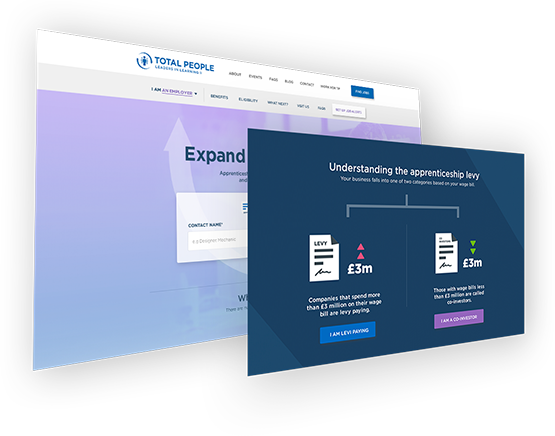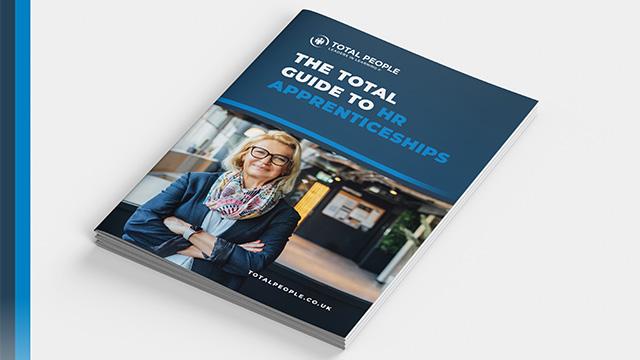Human Resources & Learning and Development Apprenticeships

HR and L&D apprenticeships
Here at Total People, we’re experts at training and upskilling HR (Human Resources) and L&D (Learning & Development) teams to achieve strategic success.
Through apprenticeships ranging from Level 3 to Level 7, employees at every level can develop their careers with a funded, recognised qualification. There are many benefits that will help to elevate your career, such as:
- Become a student/associate/chartered membership with the CIPD
- Learn relevant skills to develop your career
- Develop skills to improve business effectiveness
- Join a professional network
- Access CIPD member benefits and support
- Enhance your professional credibility
Find Your Ideal Apprenticeship
Get qualified and launch your career with a rewarding apprenticeship. Get in touch with our friendly team.
Sector insights
73%
of organisations have stress-related absence in HR*
47%
of SMEs say Digital Transformation is changing the way HR teams operate*
63%
of HR professionals have needed to upskill*
*Sources:
Explore career opportunities in HR
Thinking about your future career?
The Careerometer is a helpful online tool that can guide you in the right direction. It compares different jobs and gives you a clear picture of what you could earn once you're fully qualified.
What can the Careerometer do?
Job Figures and Expected Industry Growth
Average Salaries and Progression Opportunities
Quick Access to Job Comparisons
The learning experience

Industry expert coaches

Free access to an online learning library

Free Microsoft 365 account during study

Free student discount card

Monthly webinars

Individual coaching and mentoring sessions

Are you an employer?
Apprenticeships are a cost-effective way of upskilling your teams to have the right knowledge and behaviours to enable the future success of your business and meet strategic goals, through your people.
Our delivery can also be tailored to your organisation's learning and development needs, with expertise in navigating the skills system and funding to get the most out of apprenticeships, whether you’re an SME or larger Levy paying company.
Download the brochureApprenticeship funding
Understanding how to fund apprenticeships can seem complicated. As experts, we can guide you through the process and help you to make the most of funding options that are available to you, either as an SME or a larger Levy-paying organisation.
Funding explained

Employer support
Are you looking for more information on how apprenticeships can benefit your business?
We have a wealth of resources available to help guide you through the process and explain how we can support you at every step.
Employer HubSuccess with Total People
100%
EPA pass rate
87%
Increased job satisfaction
Frequently asked questions
|
Feature |
HR Apprenticeship |
L&D Apprenticeship |
|
Focus |
General human resources functions (recruitment, employee relations, training, payroll) |
Training and development |
|
Areas of expertise |
Broader range of HR topics |
Specialised in learning and development strategies |
|
Training content |
Includes HR fundamentals, policies, communication, and technology |
Focuses on instructional design, performance management, and employee engagement |
|
Career path |
Can lead to various HR roles (e.g., HR generalist, HR manager) |
Can lead to roles in training, development, or instructional design |
A HR apprentice is like a beginner in the HR field. They're learning the ropes and need extra help and guidance to understand how everything works.
They'll help with tasks like hiring new people, dealing with employee problems, planning training, and managing payroll.
An L&D apprentice helps with training and development in a company. They figure out what training employees need, create training programmes, and help deliver these programmes.
They also check how well the training works and help with performance reviews. This helps the company grow and improve its employees' skills.
An HR apprenticeship provides a valuable opportunity to learn practical HR skills and gain hands-on experience, such as:
- Learning soft skills.
- Posting jobs, reviewing resumes, interviewing, and welcoming new employees.
- Helping with employee questions/problems.
- Helping with training needs within the company.
- Helping with payroll.
- Learning about company policy for hiring, performance, and employee issues.
- Helping to create, use, and keep company policy.
- Being good at talking to people, both in writing and in person.
- Learning to resolve workplace issues related to HR.
- Working well with others.
- Maintaining confidentiality.
- Learning to use computer programmes for HR.
Here at Total People, we offer comprehensive guidance to employers hiring HR apprentices. We provide support in securing funding, ensuring the apprentice receives a high-quality learning experience, and offering ongoing support throughout the apprenticeship program.
We also provide guidance on legal requirements and ensure that apprentices receive the benefits they are entitled to.
We’re experts in providing HR apprentices with a range of guidance and support to ensure their success.
This includes regular meetings with a personal tutor, access to an online classroom with resources, training in HR areas, help with coursework, development of essential skills, and assistance with any challenges they may face.
This comprehensive support helps apprentices achieve their goals and build a strong foundation for a successful career in human resources.
Classroom-based training in an HR apprenticeship programme typically covers a wide range of topics related to human resources. Here are some common elements of classroom-based training:
- HR fundamentals such as employment law, recruitment, employee relations, performance management, and compensation.
- Learning about company policies and procedures related to HR functions.
- Developing effective communication and interpersonal skills to interact with employees, managers, and stakeholders.
- Learning to identify and solve HR-related issues.
- Understanding ethical principles and their application in HR practices.
- Becoming familiar with HR software and technology tools.
- Applying theoretical knowledge to real-world scenarios through case studies and simulations.
Classroom-based training is complemented by on-the-job training and practical experience. This combination allows apprentices to gain a well-rounded understanding of HR and develop the skills necessary for a successful career.
Yes! Upon completion of the apprenticeship programme, an apprentice will be equipped with the skills and knowledge to enter the HR workforce.
This provides a clear career progression pathway and ensures you retain skilled talent that you helped develop.
How much will a HR apprentice cost my business?
The cost of an apprenticeship varies depending on the size of your company - a payroll of over £3m requires you to pay an apprenticeship levy tax.
This tax is then used to contribute towards any apprentices you hire, and the apprentices hired by smaller companies. The government tops-up any levy tax contributions by 10% each month.
If you don’t pay the levy tax due to not meeting the threshold - the government will contribute 95% towards the cost of the apprenticeships - this can vary depending on the funding bands per apprenticeship programme.
The government incentives the apprenticeships by lowering the salary threshold for apprentices - this encourages employers to hire apprentices and develop talent in various industries, including HR.
Contact us to find out more about your apprenticeship funding entitlement.
It is important to make sure you’re giving your HR apprentice the best learning experience, so they have the skills to enter the HR industry upon completing their course.
The goal of a good HR apprentice employer is to develop your apprentices’ skills so you can keep them on as an employer post-graduation.
Here are some things you can do to make sure the apprenticeship programme is beneficial to both your business and your apprentice:
- Exposure to various HR areas like recruitment, employee relations, training, andpayroll.
- Opportunities to work on actual HR projects and tasks.
- Guidance from experienced HR professionals.
- Chances to connect with other HR professionals.
- Fulfilling your apprentices legal entitlement to personal development hours.
- Relevant training courses and workshops.
- Opportunities to attend conferences and webinars.
- Regular feedback on performance and areas for improvement.
- Assistance in setting and achieving career goals.
- A supportive and encouraging environment.
At the end of their apprenticeship, the apprentice will receive a formal qualification, such as a Level 3, Level 5 or Level 7 diploma in HR, accredited by a recognised awarding body. This qualification will be nationally recognised.
Contact us using this form and select employer enquiry.
We’ll then be in touch to gather your requirements and discuss the best approach to get your vacancy live. Our dedicated team of recruitment specialists will work closely with you to understand your specific HR apprenticeship requirements and help you find a suitable match.
The process of hiring an HR apprentice can be completed relatively quickly, often within 1-2 months. Due to the high demand for HR apprenticeships, suitable candidates can often be found easily.
By effectively advertising the vacancy, screening applications, and conducting interviews, employers can efficiently fill the HR apprentice role and start benefiting from their contributions to the team.
On our website and on the National Apprenticeship Service’s website, which is a national online recruitment system.
It’s managed by us. Once we have your information, we’ll add your vacancy to the National Apprenticeship Service website and monitor the number of applications.
We’ll firstly filter the applications based on what you’re looking for in a candidate. To comply with regulations, the applications will be sent via a secure file sharing system.
Just let us know the name of the person and we’ll arrange a meeting with you to organise their apprenticeship programme.
We can always extend your closing date or re-advertise your vacancy at a later date.
You’re not under any obligation to recruit someone from the site, but if you do, you’ll have to make sure they’re signed up to an apprenticeship programme with Total People.
In addition, we’ll promote your vacancy for free in our weekly applicant newsletter and highlight the vacancy on our homepage carousel. We’ll also promote your vacancy on our social media channels.




